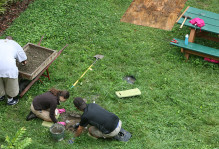Equipped to Change the World
George graduated from William and Mary in 2005. He was one of our most exceptional scholars and citizens. In many respects he personified what we hoped for. He was a talented student and gifted at initiating activity for positive change. He meandered through campus with both a sense of ease and urgency. When George entered a room you knew he had something to say.
Recently George wrote the following essay for me. I am using it for my next book. In the meantime it provides evidence of the talents that George cultivated at W&M.
“Hello madam!”
For a 21 year-old male, that greeting was one I’d never been met with before. I found myself surrounded by nearly 75 children at a place called Meeting Point Kampala in the heart of Uganda’s largest slum. Aid agencies had dubbed these children “double orphans,” kids who had lost both of their parents predominantly to HIV/AIDS. They’d never met, let alone had the chance to shake the hand of a Caucasian. They greeted me with the respect and title they bestowed upon their teaching staff—all women—because as the headmaster said, “they’ve never seen anything like you.”
Truth is, I’d never seen a need so palpable.
In a land where people like me come and go, wielding their cameras, making promises seldom kept and struggling to understand the very core of underlying social issues, I had a firm desire to be more than just the guy who came through and did what every other muzungu (white person) had come to do. I wanted to find a way to rekindle the investment of friendship I’d been challenged to make with Randy years back, fully realizing this go-round that my strength likely wasn’t spending time in a classroom, but finding a way to put up a new one.
My morning at MPK gave birth to a campaign I dubbed Christmas in Kampala. The premise was simple—to raise $10,000 between Thanksgiving and Christmas to make a surprise delivery that would single-handedly pay for the reconstruction of MPK’s current school. As a senior at William & Mary, I used virtually every connection I had made in my three years on campus to see it through. The Vice President of Student Affairs made the calls to the Development Office so we could accept donations. Organizations I was apart of contemplated what it was they could do to help. The Public Affairs office mobilized the media. Even Dining Services staff members chipped in. The response was overwhelming.
Two fellow students and I left for Uganda on the 21st of December to make our surprise delivery. By the time our plane touched down in Kampala the evening of the 23rd, CNN, The New York Times, The Washington Post and thousands of other newspapers, TV stations and Websites were covering the story. A note was left for us at the airport to call the US Ambassador in Uganda. We left the US with $12,000 that had been raised in about six weeks; we landed in Uganda to find out another $24,000 had been received.
Christmas Day was spent making our announcement and hosting a huge dinner for nearly 450 students of MPK, some of which tasted meat for the first time in their lives. As exciting as it was to deliver this variation of Christmas in Kampala, one sight burned its place my mind. Outside the tent that had been setup for our festivities stood another 450 kids, at least, who gazed at their peers with a jealousy that I could sense, but not begin to understand.
The sobering truth was that the kids gathered with us were the minority. For each one eating with us, hundreds more didn’t have the chance to take in a meal, step inside a classroom or even fall asleep under the cover of a roof. For all the work we’d put in to making Christmas in Kampala a success, I couldn’t help leaving Uganda feeling that what we had done was so very, very small.
Despite the persistence of those feelings after returning home, they were also extremely motivating. Each morning, while 38 million children in the United States wake up and head to school, it is estimated that more than 41 million children in sub-Saharan Africa have no school to attend. As a country, Uganda was and still is the world’s youngest with half of it’s estimated 30 million people under the age of 15. Although Universal Primary Education (UPE) was introduced in 1997, some districts report hundreds of thousands of children to be out of school due, among many things, to an extreme lack of infrastructure.
As I wrestled with my plans for life after college and the lingering sense that our contribution in Uganda was so little, the idea of replicating Christmas in Kampala’s success couldn’t escape my mind. That’s when Building Tomorrow was born.
Today George continues to lead Building Tomorrow www.buildintomorrow.org with similar tenacity and grace to that we witnessed while he was a student. His backpack of skills is much fuller now. He’s had years of practice. George comes back to W&M at least once a year to talk with students about his journey. In doing so he teaches and he guides. He provides answers to pressing questions that linger in the minds of students. He challenges their perspectives as well. He leaves with new connections and deeper bonds to his alma mater. We always look forward to his return trips home.


No comments.
Comments are currently closed. Comments are closed on all posts older than one year, and for those in our archive.